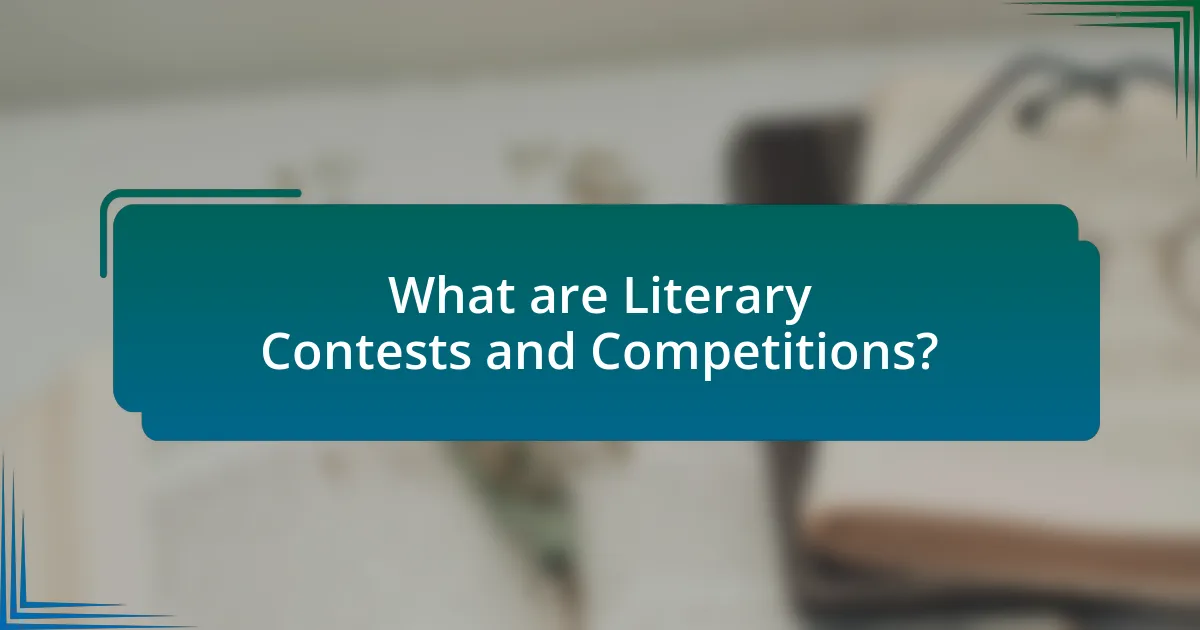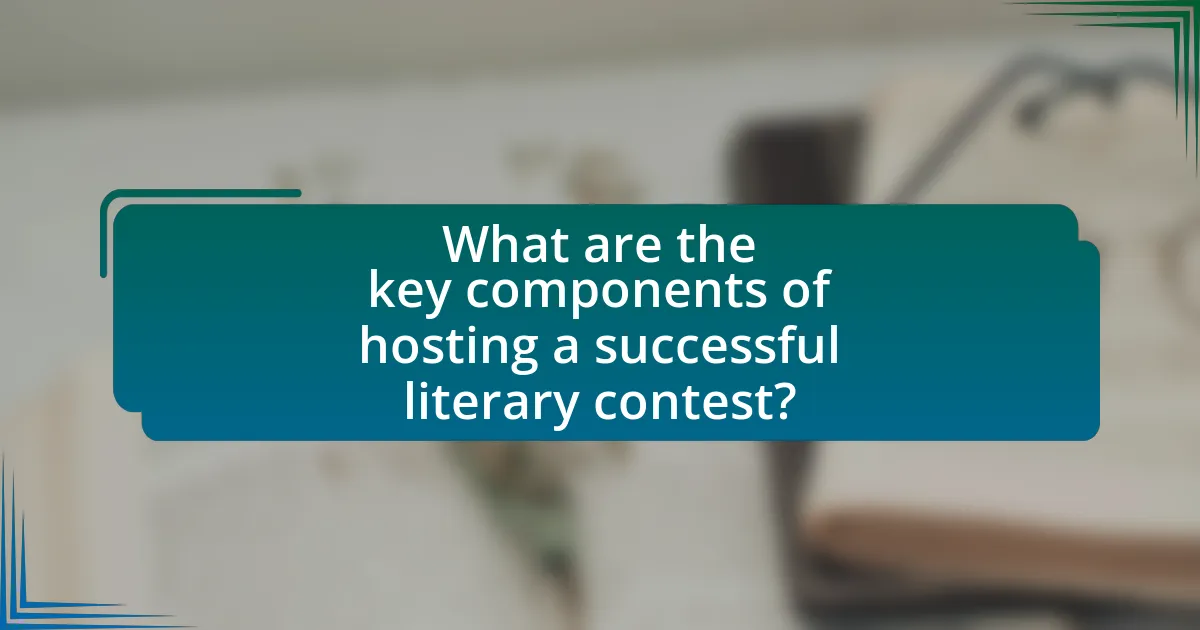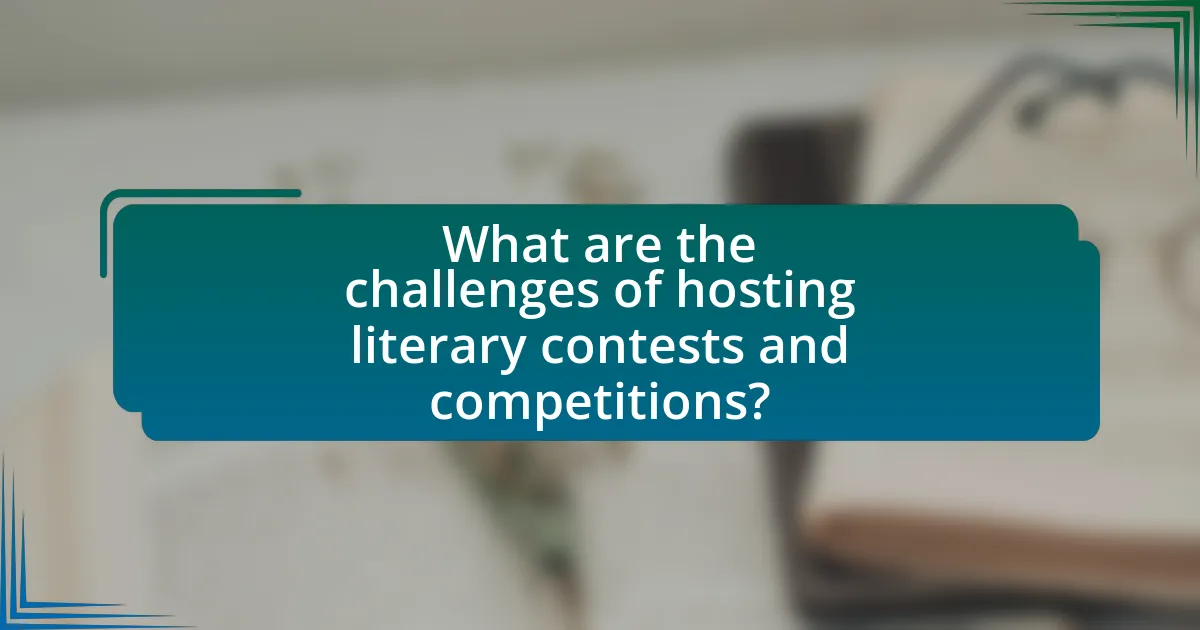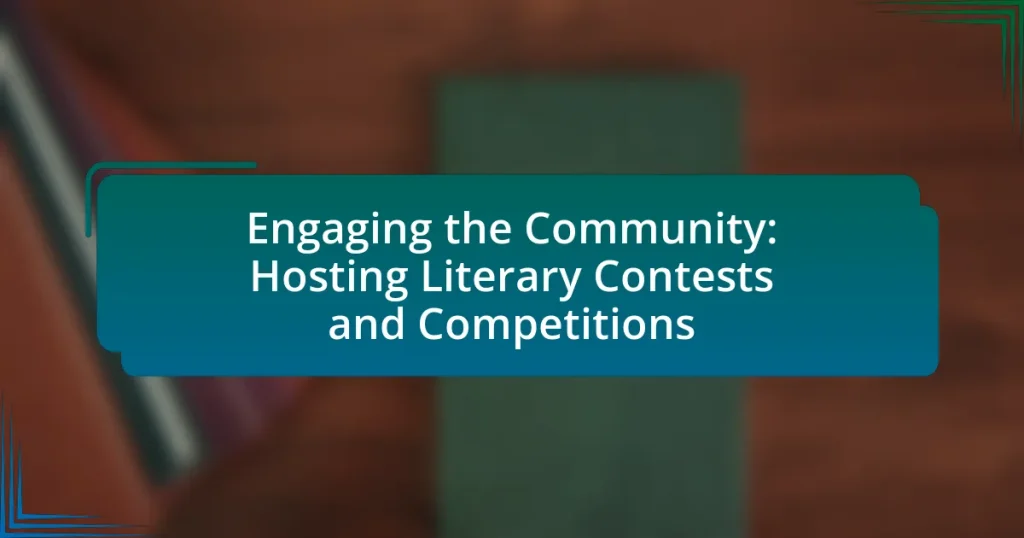Literary contests and competitions are structured events designed to evaluate writers’ works across various formats, including poetry, short stories, essays, and novels, often with the goal of fostering creativity and community engagement. These contests not only promote local talent but also enhance social cohesion by providing platforms for diverse voices to be heard. The article outlines the importance of clear guidelines, effective promotion, and qualified judging in hosting successful contests, while also addressing challenges such as participant engagement and budget constraints. Additionally, it highlights best practices and strategies for enhancing participation, ensuring that literary contests serve as valuable tools for community involvement and cultural exchange.

What are Literary Contests and Competitions?
Literary contests and competitions are structured events where writers submit their works to be evaluated based on specific criteria, often with the aim of winning prizes or recognition. These contests can vary in format, including poetry, short stories, essays, and novels, and they serve to encourage creativity, showcase talent, and foster a sense of community among writers. For instance, the prestigious Pulitzer Prize is awarded annually to recognize excellence in literature, demonstrating the significance of such competitions in promoting literary achievement.
How do literary contests and competitions engage the community?
Literary contests and competitions engage the community by fostering creativity, encouraging participation, and promoting local talent. These events create platforms for individuals to express their thoughts and stories, which can strengthen community bonds. For example, contests often involve local themes or issues, allowing participants to connect with their surroundings and share unique perspectives. Additionally, they often include workshops and readings that bring together writers, readers, and audiences, enhancing cultural exchange and collaboration. Statistics show that communities with active literary events report higher levels of civic engagement and social cohesion, demonstrating the positive impact of these competitions on community dynamics.
What types of literary contests are commonly held?
Common types of literary contests include poetry contests, short story competitions, novel writing contests, and essay contests. Poetry contests often focus on specific themes or styles, while short story competitions typically require submissions of original works within a word limit. Novel writing contests may involve submitting a manuscript or a synopsis, and essay contests often challenge writers to explore particular topics or prompts. These contests are frequently organized by literary organizations, educational institutions, and publishing houses to promote writing and engage the community.
How do these contests vary in format and purpose?
Literary contests vary in format and purpose primarily through their structure and objectives. For example, some contests may focus on specific genres, such as poetry or short stories, while others may be open to various forms of writing. Additionally, the purpose of these contests can range from promoting emerging writers to fostering community engagement or raising awareness for social issues. Contests like the National Poetry Competition aim to discover new talent, while others, such as the Write for Rights campaign, focus on advocacy and social justice. These differences in format and purpose reflect the diverse goals of literary contests in engaging communities and promoting literature.
Why are literary contests important for community engagement?
Literary contests are important for community engagement because they foster creativity and provide a platform for diverse voices within the community. These contests encourage participation from various demographic groups, allowing individuals to express their thoughts and experiences through writing. For instance, a study by the National Endowment for the Arts found that literary activities can enhance social cohesion and promote cultural understanding among participants. By bringing together writers and readers, literary contests create opportunities for dialogue and collaboration, ultimately strengthening community bonds.
What role do they play in promoting local talent?
Literary contests and competitions play a crucial role in promoting local talent by providing a platform for writers to showcase their work and gain recognition. These events often attract participants from the community, encouraging creativity and fostering a sense of belonging among local authors. By offering prizes, publication opportunities, and exposure to industry professionals, these contests incentivize participation and elevate the profiles of emerging writers. For instance, competitions like the National Poetry Slam have successfully launched the careers of numerous poets, demonstrating the tangible impact such events can have on local talent development.
How do they foster a sense of belonging among participants?
They foster a sense of belonging among participants by creating inclusive environments that encourage collaboration and shared experiences. This is achieved through structured activities such as group workshops, feedback sessions, and community discussions, which promote interaction and connection among participants. Research indicates that social engagement in group settings enhances feelings of belonging, as evidenced by a study published in the Journal of Community Psychology, which found that participants in collaborative projects reported higher levels of community attachment and personal satisfaction.

What are the key components of hosting a successful literary contest?
The key components of hosting a successful literary contest include clear guidelines, effective promotion, a qualified judging panel, and timely feedback. Clear guidelines ensure participants understand the contest rules, submission formats, and deadlines, which increases the quality of entries. Effective promotion through social media, local events, and partnerships with literary organizations can attract a diverse range of participants, enhancing community engagement. A qualified judging panel, composed of experienced writers or educators, adds credibility to the contest and ensures fair evaluation of submissions. Timely feedback to participants, regardless of the outcome, fosters a positive experience and encourages future participation. These components collectively contribute to the overall success and reputation of the literary contest.
How do you plan and organize a literary contest?
To plan and organize a literary contest, first establish clear objectives, such as promoting local authors or encouraging community engagement. Next, define the contest rules, including eligibility criteria, submission guidelines, and judging criteria. Then, select a panel of judges with relevant expertise to ensure fair evaluation. Promote the contest through various channels, such as social media, local newspapers, and community centers, to attract participants. Finally, set a timeline for submissions, judging, and the announcement of winners, ensuring all stakeholders are informed throughout the process. This structured approach has been successfully implemented in various literary contests, demonstrating its effectiveness in fostering community involvement and celebrating literary talent.
What are the essential steps in the planning process?
The essential steps in the planning process for hosting literary contests and competitions include defining objectives, identifying the target audience, establishing rules and guidelines, selecting judges, promoting the event, and evaluating outcomes. Defining objectives clarifies the purpose of the contest, such as fostering creativity or community engagement. Identifying the target audience ensures the contest appeals to the right participants, while establishing rules and guidelines provides a framework for fair competition. Selecting judges is crucial for maintaining credibility, and promoting the event increases participation. Finally, evaluating outcomes allows organizers to assess the success of the contest and gather insights for future events.
How do you select judges and establish criteria for evaluation?
Judges are selected based on their expertise in literature, writing, and relevant experience in evaluating literary works. The criteria for evaluation are established by defining specific metrics such as originality, creativity, adherence to theme, and technical proficiency. For instance, a panel may consist of published authors, educators, and literary critics who possess a deep understanding of the genre being judged. This ensures that the evaluation process is both fair and informed, as evidenced by established literary organizations that often employ similar methods to maintain high standards in their competitions.
What strategies can enhance participation in literary contests?
To enhance participation in literary contests, organizers can implement targeted outreach strategies, such as collaborating with local schools and writing groups. Engaging educational institutions can increase awareness and encourage student submissions, as evidenced by programs like the Scholastic Art & Writing Awards, which saw a significant rise in entries through school partnerships. Additionally, offering diverse categories and themes can attract a wider range of participants, as seen in contests that include genres like poetry, fiction, and non-fiction, appealing to various writing styles. Providing clear guidelines and feedback mechanisms can also motivate participants, as research indicates that constructive feedback improves engagement and submission rates.
How can marketing and outreach be effectively executed?
Effective marketing and outreach can be executed by leveraging targeted digital strategies and community engagement initiatives. Utilizing social media platforms, email marketing, and local partnerships can enhance visibility and participation in literary contests. For instance, a study by the Content Marketing Institute found that 70% of consumers prefer to learn about products through content rather than traditional advertising, indicating that informative and engaging content can attract a larger audience. Additionally, hosting events in collaboration with local schools and libraries can foster community involvement and increase outreach effectiveness.
What incentives can be offered to attract more participants?
To attract more participants in literary contests and competitions, offering monetary prizes is highly effective. Research indicates that financial incentives significantly increase participation rates, as seen in various competitions where cash awards led to a 30% increase in entries. Additionally, providing recognition opportunities, such as publication in literary magazines or featuring winners on social media platforms, enhances visibility and motivates individuals to participate. Furthermore, offering workshops or mentorship sessions with established authors as part of the prize can attract aspiring writers seeking guidance and professional development. These incentives not only draw participants but also foster a sense of community and engagement within the literary field.

What are the challenges of hosting literary contests and competitions?
Hosting literary contests and competitions presents several challenges, including ensuring fair judging, attracting quality submissions, and managing participant expectations. Fair judging is critical, as biases can undermine the integrity of the contest; thus, establishing clear criteria and diverse judging panels is essential. Attracting quality submissions can be difficult, especially in a saturated market where many contests exist, necessitating effective marketing strategies to reach potential participants. Additionally, managing participant expectations involves clear communication regarding contest rules, timelines, and feedback, which can be challenging to maintain consistently. These challenges require careful planning and execution to foster a successful literary contest.
What common obstacles do organizers face?
Organizers of literary contests and competitions commonly face obstacles such as limited funding, participant engagement, and logistical challenges. Limited funding restricts the ability to offer attractive prizes or marketing efforts, which can diminish interest and participation. Participant engagement is often hindered by a lack of awareness or perceived barriers to entry, leading to lower submission rates. Logistical challenges include managing timelines, ensuring fair judging processes, and coordinating event details, which can overwhelm organizers and impact the overall success of the competition.
How can budget constraints impact the contest?
Budget constraints can significantly limit the scope and quality of a contest. When financial resources are restricted, organizers may have to reduce prize amounts, limit marketing efforts, or cut back on event logistics, which can diminish participant engagement and overall contest appeal. For instance, a study by the National Endowment for the Arts indicates that contests with higher prize offerings attract more participants, suggesting that budget limitations directly correlate with reduced interest and competition quality.
What issues may arise with participant engagement and retention?
Participant engagement and retention may face issues such as lack of motivation, unclear contest guidelines, and insufficient communication. Lack of motivation can stem from participants feeling that their efforts will not be recognized or rewarded, leading to decreased interest in participation. Unclear contest guidelines can create confusion, resulting in participants disengaging due to uncertainty about expectations or submission criteria. Insufficient communication, including failure to provide timely updates or feedback, can lead to participants feeling disconnected from the contest, ultimately affecting their willingness to remain engaged. These factors collectively contribute to lower retention rates in literary contests and competitions.
How can these challenges be overcome?
To overcome challenges in engaging the community through literary contests and competitions, organizers should implement targeted outreach strategies. These strategies include collaborating with local schools, libraries, and community centers to promote events, thereby increasing participation and visibility. Research indicates that community partnerships can enhance engagement; for instance, a study by the National Endowment for the Arts found that collaborative programs significantly boost attendance and involvement in literary activities. Additionally, offering diverse categories and formats can attract a wider audience, ensuring inclusivity and broader representation.
What best practices can be implemented to ensure success?
To ensure success in engaging the community through hosting literary contests and competitions, it is essential to establish clear guidelines and objectives for the events. Clear guidelines help participants understand the expectations and criteria for judging, which can lead to higher quality submissions and increased participation. For instance, the National Novel Writing Month (NaNoWriMo) has successfully engaged thousands of writers by providing structured goals and a supportive community, resulting in over 400,000 participants in 2020 alone. Additionally, promoting the contests through various channels, such as social media, local schools, and libraries, increases visibility and attracts a diverse range of participants. This multi-channel approach has been shown to enhance community involvement and foster a sense of belonging among participants.
How can feedback from previous contests improve future events?
Feedback from previous contests can significantly enhance future events by identifying strengths and weaknesses in the organization and execution of the contests. Analyzing participant feedback allows organizers to understand what aspects were well-received, such as judging criteria or engagement activities, and which areas need improvement, like communication or prize distribution. For instance, a survey conducted after a literary contest revealed that 75% of participants valued clear guidelines, prompting organizers to refine their instructions for future events. This iterative process of incorporating feedback leads to better participant experiences, increased engagement, and higher overall satisfaction in subsequent contests.
What are some practical tips for hosting literary contests?
To host a successful literary contest, establish clear guidelines and criteria for submissions. This includes defining the genre, word count, and eligibility requirements, which helps participants understand what is expected. Additionally, promote the contest through various channels such as social media, local literary groups, and community centers to maximize reach and engagement.
Setting a reasonable timeline for submissions and judging ensures that participants have ample time to craft their entries while allowing judges to evaluate them thoroughly. Offering attractive prizes, such as publication opportunities or gift cards, can incentivize participation and enhance the contest’s appeal.
Finally, consider involving local authors or literary figures as judges to lend credibility and attract more participants. This approach not only enriches the judging process but also fosters community connections within the literary scene.
How can technology be leveraged to streamline the process?
Technology can be leveraged to streamline the process of hosting literary contests and competitions by utilizing online platforms for submissions, judging, and feedback. These platforms, such as Submittable or Woobox, allow for efficient collection and organization of entries, reducing the administrative burden on organizers. Additionally, automated scoring systems can facilitate quicker evaluations by judges, ensuring a fair and transparent process. Research indicates that digital tools can enhance participant engagement, with a study by the Pew Research Center showing that 73% of adults believe technology improves communication and collaboration in community activities.
What resources are available for organizers to utilize?
Organizers can utilize various resources such as online platforms, community partnerships, and promotional tools. Online platforms like social media and event management websites facilitate outreach and participant engagement. Community partnerships with local libraries, schools, and literary organizations provide venues and support for events. Promotional tools, including flyers, newsletters, and press releases, help in advertising contests effectively. These resources enhance visibility and participation, making literary contests more successful.


